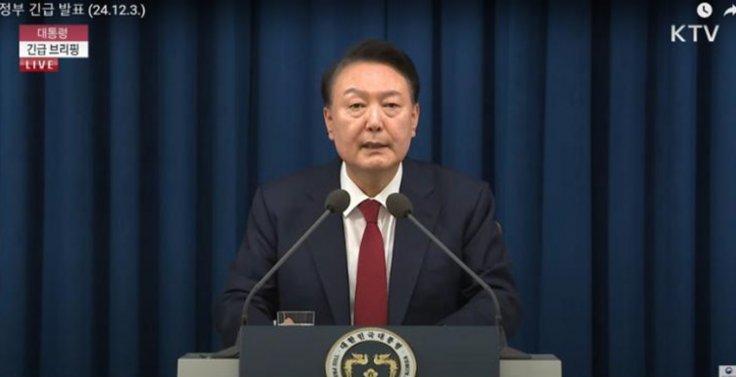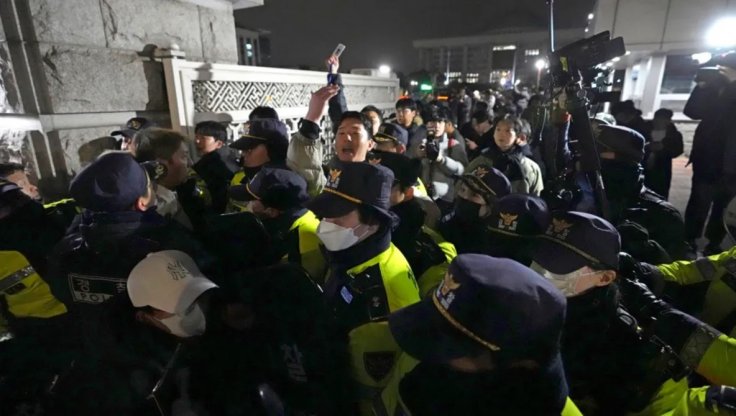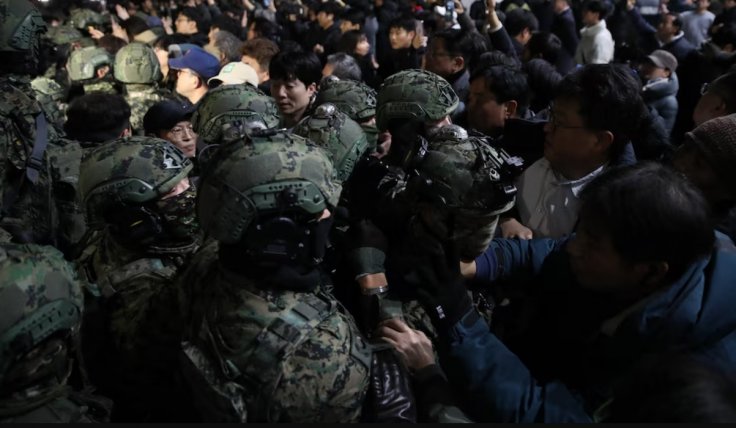South Korean President Yoon Suk Yeol's government early Wednesday lifted the martial law he had shockingly imposed during a dramatic and tense political standoff that saw a tense night wherein military forces surrounded the parliament, while lawmakers cast their votes to oppose military rule.
The martial law was officially revoked around 4:30 a.m. during a Cabinet session, ending its enforcement after roughly six hours. The Cabinet's decision came after Yoon's reversal of his brief martial law decree early Wednesday morning, which included pulling back the troops initially deployed to enforce the order. South Korean legislators, who opposed the martial law directive, are now demanding resignations in response to the events.
Chaos in South Korea

The opposition Democratic Party has said that it will start impeachment proceedings against Yoon unless he resigns without delay. "We will not sit idly by and watch President Yoon's crime of destroying the Constitution and trampling on democracy," the party said.
"President Yoon should immediately resign voluntarily."
Han Dong-hoon, the leader of Yoon's ruling People's Power Party, issued an apology to the public in a statement to reporters on Wednesday morning and demanded that the the country's defense minister be fired.
"The president must directly and thoroughly explain this tragic situation," he added. "The minister of defense, who recommended this martial law, should be immediately dismissed, and all those responsible must be held strictly accountable."

The last time a South Korean president imposed martial law was in 1980, amid a nationwide uprising driven by students and labor unions.
On Tuesday night, Yoon unexpectedly declared martial law during a late-night address, evoking memories of South Korea's authoritarian past. Following his announcement, troops tried to enter the National Assembly's main chamber, while protesters opposed to the measure gathered outside.
A Night of Uncertainty
Yoon accused the main opposition Democratic Party of engaging in anti-state activities and aligning with North Korea. He cited a motion by the opposition parliamentary majority to justify his claims to impeach senior prosecutors and reject the government's budget proposal.

In response, lawmakers acted quickly to counter Yoon's martial law declaration. Within hours, 190 out of 300 parliament members voted to nullify the decree.
In his martial law announcement, Yoon described the opposition's actions as "clear anti-state behavior aimed at inciting rebellion." He also claimed that these activities had "paralyzed state affairs and turned the National Assembly into a den of criminals."
"To safeguard a liberal South Korea from the threats posed by North Korea's communist forces and to eliminate anti-state elements... I hereby declare emergency martial law," Yoon said in the address.

Yoon described martial law as a crucial step to eliminate what he called "shameless pro-North, anti-state forces." He defended the move as vital for safeguarding the people's freedoms and security, preserving the nation's stability, and ensuring a prosperous country for future generations.
Shortly after 1 a.m. in Seoul on Wednesday (11 a.m. ET Tuesday), dozens of soldiers who had entered the main parliamentary building ahead of the vote were seen leaving, as reported by the Korean newspaper Chosun Ilbo and local TV stations.
Crowds gathered outside the building erupted in cheers upon hearing the news of the lawmakers' vote, according to Chosun Ilbo. Some in the crowd shouted, "Long live the Republic of Korea!" and "Yoon Suk-yeol, step down!"









